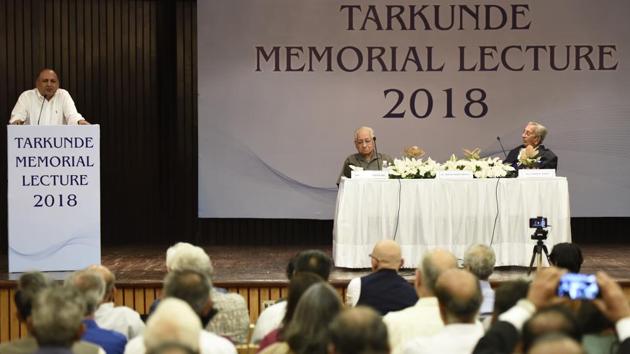More personal freedoms, less public capacity: Social scientist Pratap Bhanu Mehta
Social scientist Pratap Bhanu Mehta said on Friday “extraordinary” expansions of personal freedoms were simultaneously creating an era of “enormous social conformity”.
Social scientist Pratap Bhanu Mehta said on Friday “extraordinary” expansions of personal freedoms were simultaneously creating an era of “enormous social conformity”.

The Ashoka University vice-chancellor, while delivering the 11th Vithal Mahadeo Tarkunde Memorial Lecture, was referring to what he called a central paradox of modernity: while the personal sphere was characterised by increasing freedoms, the public sphere was marked by “rage, rancour and rigidity”.
Individuals, despite enjoying greater freedoms today, are somehow rendered powerless in “collectively shaping social structures that impinge them”, Mehta said. This was the disenchantment of freedom, he said in his lecture titled ‘Freedom and its Discontents’. Tarkunde (1909-2004) was one of India’s foremost civil rights lawyers and a judge of the Bomb- ay high court. He is often referr- ed to as the ‘Father of the Civil Li- berties movement’ in the country.
“…if individuals are liberated because they are no longer bound by any teleologies of customs and traditions, if the idea that modernity is this realm of increasing choice… if these ideas are getting more entrenched… how do we ex- plain what is happening to, in a sense, our public realm,” Mehta said. He began with a line by Nobel-winning Russian poet Joseph Brodsky who was hounded out by Soviet authorities: “Freedom is when you forget the spelling of the tyrant’s name.”
Greater freedom, often achieved through constitutional means, “at the same time produces a sense of powerlessness in their actual ability to shape the collective surroundings”, he said.
Mehta said there were many versions of this contradiction of modern times, such as Marx’s concept of “alienation”. Marx described alienation as workers’ loss of control over their own lives and the commodities they produced under the capitalist mode of production.
“There is Marxist version of the argument that the sense of expanding freedom was really an experience of commodification of the individual; the sense of expanding occupational choice was a chimera because one did not in any way shape the condition under which one works, or had the appropriate kind of relationships to the products we produce,” Mehta said. It is actually quite possible, he said, for people to want all basic freedoms and yet carry the burden of the discontents these freedoms produced.






